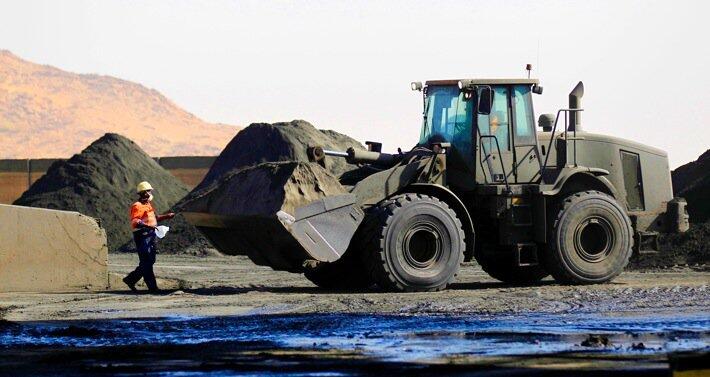Eritrea’s hobbled economy will get a boost when new gold, copper and zinc mines begin production. Despite the commodity crisis, the government is banking on the sector to provide much-needed jobs.
Bisha has contributed more than $755m to the Eritrean economy since it began production in February 2011, according to Nevsun Resources, the Canadian mining company that owns 60% of the mine.
While the government says that much of this revenue goes towards operational costs and debt repayments, there is little doubt that more mines would offer a dramatic lift to Eritrea’s economy, which is struggling under the burden of mass migration, UN sanctions and diplomatic isolation.
Enamco
The potential role for mining to help spur Eritrea’s economy is not hard to see. The Eritrean National Mining Corporation (Enamco) gets an automatic 10% stake in every mining project, as well as the option to buy an additional 30% share, as per the Western Australian mining code, on which Eritrea based its mining laws. Eritrean state-owned companies, mainly Segen Construction Company, have also earned money building roads and staff housing from the mines.
Alem Kibreab, the director general of Eritrea’s energy and mines ministry, tells The Africa Report: “The contribution that mining will make to the Eritrean economy will be tremendous. If you have four mines running and if there’s a good price of metal at that time, then the contribution will be really significant.”
The African Development Bank estimates that Eritrea’s economy grew by 2.1% in 2015, up from 1.3% growth in 2013. The World Bank put Eritrea’s 2014 gross domestic product at $3.9bn.
Profits leave in dollars
Hagos Ghebrehiwet, an adviser to Eritrea’s President Isaias Afewerki and an architect of the rebirth of the country’s mining industry, plays down the importance of the sector today. However, he argues that it will play a trans formative role in the future.
Hagos says that Eritrea earns about $200m per year from Bisha: “What is $200m a year in Eritrea? Nothing. Our annual fuel bill is over $300m. Food imports are about $200m,” he says. “Almost 85% of the revenues from mining are spent through foreign currency on fuel, trucks, spare parts. So it’s going out not into the economy.”
Running underneath Eritrea’s arid mountain landscape is the Arabian Nubian Shield, a stretch of minerals that straddles both sides of the Red Sea. Many deposits of gold, copper, zinc and potash are buried deep in the ground. The country is attracting a host of exploration outfits and junior miners keen to discover world-class assets with the aim of selling them on to major companies down the line or bringing in investors to develop them.
Eritrea’s first mine
Eritrea’s first mine, the Bisha Mining Share Company, employs about 1,500 people and is a 24- hour operation that produces 688tn of copper concentrate and 166tn of copper every day. It is expected to yield copper and zinc until 2025, but further exploration in nearby Harena and Mogoraib River could to extend its life. Cliff Davis, Nevsun’s chief executive officer, says: “We expect that the Bisha mine will go on for decades, with the state as its partner.”
Eritrea’s first mineral exploration was carried out in Debarwa, a town just south of Asmara, in 1955, when Eritrea was still part of Ethiopia. Prospector Michael Tekele was the first person to discover a mineral deposit in Eritrea, which was a former Italian colony, then a British protectorate, and finally a province within Ethiopia until it gained its independence in 1991.
Combing through the desert in Debarwa, a short drive away from Asmara, a deposit of gold, copper and zinc was found. The government signed a deal with Nippon Mining, a Japanese firm, to build an 180m headframe to drill deep beneath the earth and extract mineral samples. About 75 holes were drilled between 1970 and 1974, as interest in the sector gathered.
Eritrea’s first mine was hit by claims from Human Rights Watch (HRW) in 2013 that people working in the national service were forced to work in its early stages of construction. Three former conscripts who say they worked at the mine have sued Nevsun in the Supreme Court of British Columbia in Canada, saying that the company failed to protect their human rights. Davis, Nevsun’s chief executive, has said he is “confident that the allegations are unfounded”. Leslie Lefkow, deputy Africa director at HRW, describes as “worrying” Nevsun’s “reluctance to admit it ever used forced labour, even in the early construction phase”.
Job creation
Bisha is setting the benchmark for future mining projects, says Fesseha Ghebrehiwet, chief services officer at the Bisha Mining Shares Company and a former EPLF fighter. “What you see here will be replicated in other places around the country. We have to be very careful. It has to be world class.”
Critics say the government is banking on mining cash to paper over the cracks in the regime. Eritrea does not publish a national budget, and mining industry insiders say they do not know where revenue from the mining sector are spent. “It’s a black hole,” says another Western diplomat who requested anonymity.
Feruz Werede, an Eritrean activist, says: “For the past several years, Eritreans have been putting up with all sorts of violations perpetrated by the government in the hope that things would get better when the economy recovers as a result of new mining revenues. But several years into the mining boom, things seem to have gotten worse and Eritreans – particularly the young – are giving up hope that the situation will improve.” She adds: “They are resorting to leaving the country to escape the regime’s grip.”












